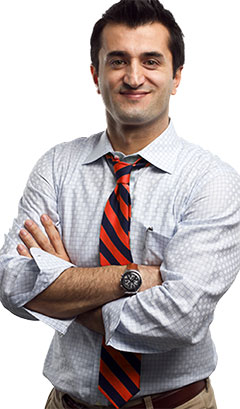Growing Interest
July 30, 2015
From Maxwell Perspective...
Growing Interest
Yüksel Sezgin takes over Middle Eastern Studies at a time when enrollment and programs are booming.
Growing up in Turkey in the 1980s and ’90s, Yüksel Sezgin was always struck by how little most people knew about the Middle East — a part of the world that Turkey ruled for nearly 400 years. “My idealist motivation was to travel the region; learn about the history, culture, and languages; and help to fill in this knowledge gap,” Sezgin recalls. That mission guided him through graduate work in Middle Eastern studies, political science, and public law — and now to his new position as director of SU’s Middle Eastern Studies Program.

Yüksel Sezgin is the new director of Middle Eastern Studies.
A specialist in comparative religious law and assistant professor of political science, Sezgin has an exceptionally broad perspective on the Middle East. His education spanned the University of Ankara, the Hebrew University of Jerusalem, the University of London, and the University of Washington; and the research for his first book, Human Rights under State-Enforced Religious Family Laws in Israel, Egypt, and India (Cambridge), led him from Tel Aviv to Cairo to New Delhi. Sezgin’s current project, with the working title Democratizing Shari’a, explores how non-Muslim democracies such as Israel, India, Greece, and Ghana tackle the challenges of implementing shari’a law.
In Middle Eastern Studies, Sezgin is taking the helm of a program that has grown tremendously since its founding in 2003, spearheaded by political scientist Mehrzad Boroujerdi. Today MES is SU’s most popular regional studies program — encompassing a major and minor, a graduate certificate, and study-abroad opportunities, with more than 20 Middle East experts across campus teaching roughly 80 courses (including Arabic, Hebrew, Turkish, and Persian languages).
“I never imagined that we would grow so much in a dozen years,” says Boroujerdi, now chair of Political Science. He describes Sezgin, who joined the faculty in 2013, as “very capable, energetic, and research active.”
Sezgin’s far-ranging
international background helps to shape his agenda. “One of the things I want
to do for the program,” he says, “reflecting my own experience as a scholar,
is to internationalize the curriculum — providing more opportunities for
students to spend time in different countries, be exposed to different cultures,
and learn languages.”
“I want students who major or minor in Middle Eastern studies to put their hands on real cutting-edge research.”
— Yüksel Sezgin
Currently, Boroujerdi and his political science colleague Matt Bonham lead a summer course in Turkey titled the Road to Democracy in the Islamic World. Other SU faculty members have introduced a seminar on women and gender in the Arab world, which travels to Jordan and Lebanon. Sezgin plans to expand such offerings, and to nurture faculty/student research partnerships as well. “I want students who major or minor in Middle Eastern studies to put their hands on real cutting-edge research,” he says, “and interact with faculty beyond the classroom.”
Recent faculty hires in history, geography, religion, and women’s and gender studies have bolstered the ranks of Middle East specialists at the University. Sezgin aims to build on this growth, with the long-range goal of establishing the Middle Eastern Studies Program as a U.S. Department of Education National Resource Center for language and area studies.
The mission of spreading knowledge about the Middle East has never been more urgent, with issues such as the rise of ISIS, Iran’s nuclear program, and the Arab/Israeli conflict dominating international news.
“Nothing is black and
white, especially when it comes to the politics of an ancient area like the
Middle East,” says Sezgin. “To understand the complications of the region,
you’ve got to know the history and culture. You’ve got to spend time. This is
what we do. Our doors are always open, so we can give a better representation
of the region to the American public at large.”
— Jeffrey Pepper Rodgers
This article appeared in the summer 2015 print edition of Maxwell Perspective; © 2015 Maxwell School of Syracuse University.